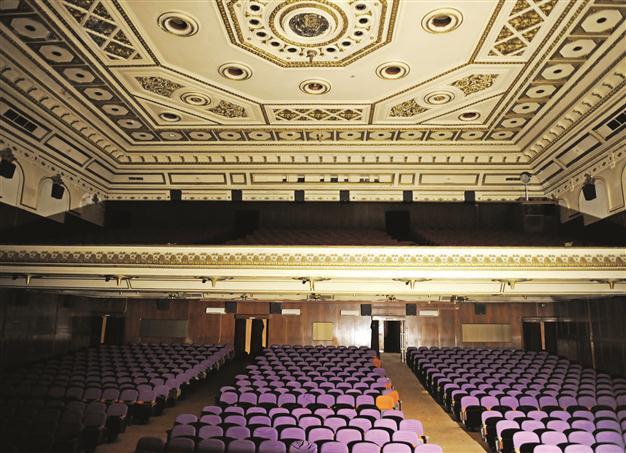The Restoration Committee responsible for Emek case
ISTANBUL - Hürriyet Daily News

Representatives from Kamer Construction took members of the press on a tour of the Cercle d’Orient Building Complex yesterday.DAILY NEWS
photo, Emrah GÜREL
The Renovation Committee should be asked whether the structural support of the
Emek Theater really makes it impossible to renovate the building in its original place, according to architect Sakine Yıldız Salman, who co-lectures the Relief and Restoration Studio class at
Istanbul Technical University Architecture Department, together with Kutgun Eyüpgiller, the consultant of the building’s renovation project.
Eyüpgiller refused to answer questions about whether it was necessary to move the theater or whether it was more costly to undertake such a complicated process instead of renovating the theater in its original place. On being asked the same question, Salman said this should be asked of the Renovation Committee. “I have not studied the building but it is probable that its structural support has been damaged,” she said. “This is because the Emek and İpek Theaters and the Melek and İsketinj Blocks are built as extensions of the Cercle d’Orient building. Emek Theater’s foyer is built by entering into the Melek Block. Therefore, a building complex which has experienced so many similar interventions is likely to have problems in terms of structural statics. But even if this necessitates its demolition and rebuilding, this does not explain moving upstairs.”
She added that the buildings might get burned down or collapse after an earthquake, as was the case with La Scala, which was burned down, almost to nothing, after a very serious fire. “The reason why this building was rebuilt is that it was so badly damaged, which is not the case at all with Emek Theater. What determines what you are going to do in these cases is which concern outweighs which value, or vice versa.”
‘The main purpose is increasing settlement area’Salman said the report given by her colleague that quotes the university she is employed at could not be said to have been needed only due to the construction firm’s scientific needs, as the project’s architect Fatih Kesgün has previously said.
“Put yourself in their shoes. You are applying at a committee asking for permission for such an ambitious renovation project. Having such a report in your folder is useful in order to stand confidently and show the committee that you have made every necessary study. The committee would ask for such a report anyway, even if you didn’t already have it with you.”
She said that rather than questioning a company for getting a report on payment, or an academic for issuing a report on payment, the Renovation Committee – which itself demands a similar report for 90 out of 100 renovation projects - should be questioned.
“This need for outsourced reports shows that the committee cannot make decisions based on its own sources. Only a very small amount of the renovation and preservation committees have a restoration expert in them. The renovation committees say that they need outsourced services in a project that includes a heavy intervention, or which demands additional settlement areas in the renewal area, because they cannot go and make the required studies themselves. But the problem is that any renovation project that relies on the Law No. 5366 is based on increasing settlement within the total renewal area. What makes these projects desirable by the construction companies is nothing but this availability to increase the settlement area within the total area, because this renders the project commercially attractive.”
Salman said the renovation method used in these buildings was also determined with this target to increase the settlement area and any similar intervention was therefore doomed to yield unwanted results in terms of globally acknowledged preservation principles.
She also said the renovation committees’ need for outsourced services in these projects would not mean that they would necessarily welcome any report with which they are presented. “The committees’ right to determine the kind of approach the report should follow is preserved by law. What I mean is that the renovation committee that determines in which fashion the restoration would be doesn’t have to be based on the reports. The committee is allowed to completely ignore a report they are presented or to ask for another one. But in Emek’s case, they don’t,” she said.
She also said academics like her were very frequently asked for similar reports. “We evaluate the projects, and if we see fit we give the report. If we don’t, we tell them to apply to someone else.”
cinema, Turkey,
